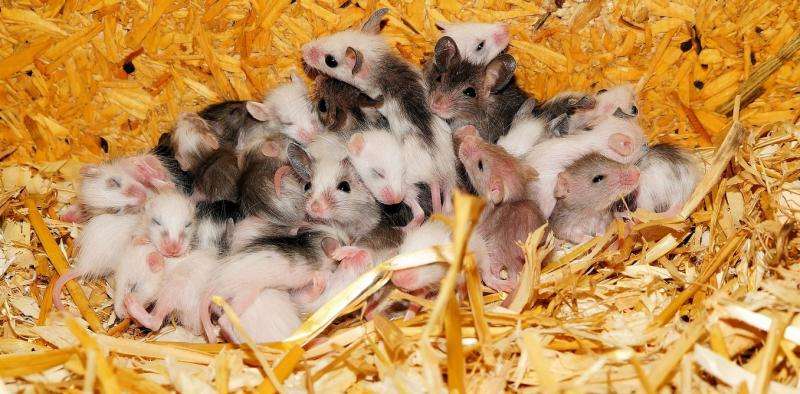Huddled mice could change the way we think about evolution

Adapt or die. That's the reality for an animal species when it is faced with a harsh environment. Until now, many scientists have assumed that the more challenging an animal's environment, the greater the pressure to adapt and the faster its genes evolve. But we have just published new research in Royal Society Open Science that shows that genes might actually evolve faster when the pressure to adapt is reduced.
We built a simple computer model of how evolution may be affected by the way animals interact with each other when they're in groups. Specifically, we looked at what happens to animals that huddle together to keep warm.
We found that when animals huddle in larger groups, their genes for regulating temperature evolve faster, even though there is less pressure to adapt to the cold environment because of the warmth of the huddle. This shows that an organism's evolution doesn't just depend on its environment but also on how it behaves.
When animals such as rats and mice huddle together in groups, they can maintain a high body temperature without using as much energy as they would on their own. We wanted to understand how this kind of group behaviour would affect a species' evolution.
To do this, we built a computer model simulating how the species' genes changed and were passed on over multiple generations. When the effects of huddling were built into the computer model, the reduced pressure to adapt was actually found to accelerate evolution of the genes controlling heat production and heat loss.
Why was this? Well, when there's less pressure to evolve, the genes are freer to experiment. When two related genes (or sets of genes) are well adapted to the environment, mutation of one gene may have catastrophic consequences for the species unless the other gene mutates at the same time in a complementary way.
For example, newborn babies' head size and female pelvic size depend on each other. If head sizes get bigger then so should pelvic sizes. If genetic pairs do not change simultaneously then evolution can get stuck, unable to fully explore the space of possible combinations of genes and so unable to discover better adaptations to the environment.

But when selection pressure on a gene is relaxed, the consequence of a mutation in that gene is not catastrophic for the species. This makes it possible for evolution to explore new combinations of genes that might eventually lead to fitter organisms. And huddling is a great example of how selection pressure can be relaxed.
Mutations that cause animals to generate too much or too little heat can be tolerated because the animals can simply huddle a bit more or less to adjust. So, according to our model, huddling allows evolution to explore the space of possible genes more freely to find the best combination.
Self-organisation
This result is particularly interesting for two reasons. First, it shows that behavioural adaptations that happen within the lifetime of an animal, such as huddling, could alter the course of evolution. This is not obvious given that the genetic information we possess essentially remains fixed throughout our lifetimes.
Second, because huddling is an example of self-organising behaviour among a group of animals, our results suggest that this example may be ideal for exploring how self-organisation affects evolution more generally. Self-organisation describes how a collection of simple entities (like a group of cold rats) can create something more complex (like a huddle) without any instruction. Like natural selection, self-organisation shapes everything in the natural world, from the formation of snowflakes to the translation of genetic code into bodies and brains.
Certain aspects of self-organisation are reasonably well understood, but how self-organisation interacts with natural selection is not one of them. So understanding how huddling affects the evolution of temperature regulation might help shed light on one of the most fundamental questions in biology: how do self-organisation and natural selection interact to shape the natural world?
More information: Royal Society Open Science, rsos.royalsocietypublishing.or … /10.1098/rsos.160553
Journal information: Royal Society Open Science
Provided by The Conversation
This article was originally published on The Conversation. Read the original article.![]()


















